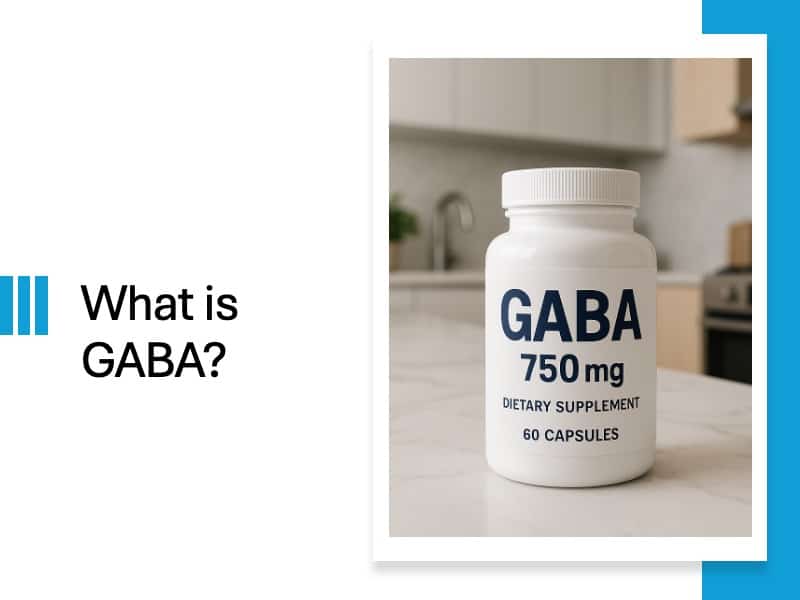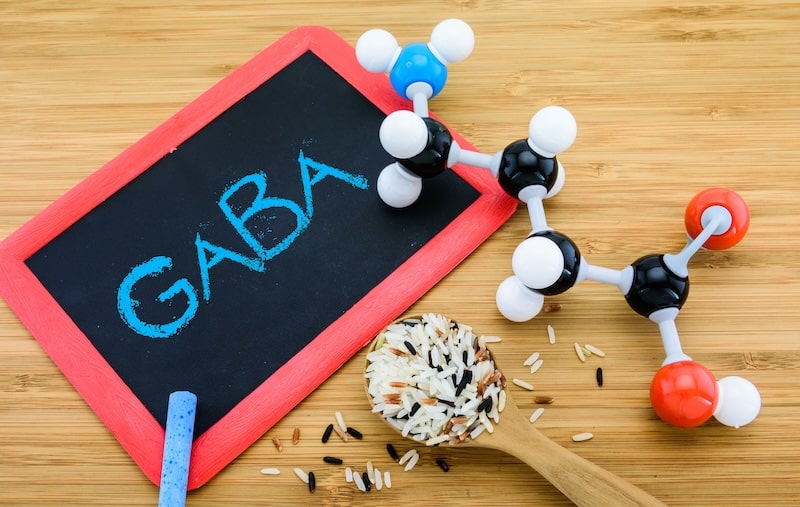Gamma-Aminobutyric Acid (GABA): What It Is, Function & Uses
GABA, short for gamma-aminobutyric acid, acts as the brain’s natural brake system bycalming overactive neurons and helping maintain balance between stimulation and relaxation.
It’s the body’s built-in mechanism for composure, influencing how we handle stress, sleep, and even focus under pressure.
While supplements promising better rest or less anxiety are increasingly popular, research on GABA’s direct benefits remains mixed.
I personally only tried a GABA supplement once and stopped after the first day because it unexpectedly triggered severe anxiety.
I don’t have much personal experience with this compound and can’t recommend taking it as a supplement, although some limited research does suggest potential benefits in specific cases.
Some studies suggest that modest doses, around 75 to 120 mg per day, can improve sleep onset and relaxation, but evidence for higher doses or long-term use is limited.
What’s clear is that true GABA optimization begins with the basics: nourishing foods, consistent exercise, adequate sleep, and intentional stress management.
These lifestyle choices increase GABA activity far more reliably than any capsule.
For most healthy adults, short-term use appears safe, but pregnant women, children, and individuals with medical conditions should seek medical guidance first.
Like any tool for recovery or performance, GABA works best when it complements a balanced approach, not as a magic fix, but as part of a broader plan for mental clarity, calmness, and long-term health.
What is GABA?

Gamma‑aminobutyric acid (GABA) is a naturally occurring amino-acid-derived compound that serves as the principal inhibitory neurotransmitter in the mature mammalian central nervous system (CNS) and a major inhibitory transmitter in the spinal cord (Jewett & Sharma, 2023).
It is synthesised from the excitatory neurotransmitter glutamate via the enzyme glutamate decarboxylase (GAD), using vitamin B6 (pyridoxal phosphate) as co-factor.
Because it is inhibitory, GABA acts to dampen neuronal excitability by hyper-polarising the post-synaptic membrane (making it less likely the neuron will fire an action potential).
What Does GABA Do?
GABA’s key role is to moderate and fine-tune the firing of neurons by binding to GABA receptors (notably GABA_A, GABA_B, and GABA_C) and opening ion channels (such as chloride channels) that lead to hyperpolarisation of the neuron, thus reducing excitability (Chen & Sharma, 2025).
By doing so, GABA helps regulate processes such as anxiety, irritability, concentration, sleep, seizure susceptibility, and elevation of mood.
In other words, GABA is like the brain’s “brake pedal” on over-excitation.
Because of its widespread distribution (participating in perhaps ~40% of inhibitory synapses in adult vertebrate brains) it is fundamental to balance between excitation and inhibition (Ochoa-de la Paz et al., 2021).
Does GABA Make You Sleepy?
Yes, GABA can make you sleepy.
Because GABA is inhibitory and tends to reduce neuronal activity, increased GABAergic signalling (or intake of GABA supplements) may lead to drowsiness, fatigue or sedation in some individuals.
In fact, one safety study observed that ~5% of participants reported drowsiness after taking 300 mg of GABA for a short period (Byun et al., 2018).
Given that effect, it is generally advisable when first trying GABA to avoid tasks requiring full alertness (e.g., driving a vehicle) until you know how you respond.
What is GABA Good For?
GABA’s inhibitory role suggests utility in a number of physiological and possibly therapeutic contexts:
- Sleep: Because it dampens neuronal excitability, increased GABA-ergic activity may support transition into sleep and deeper sleep phases.
- Anxiety & stress: Low GABA levels are associated with heightened anxiety, and boosting GABA may help with calming the nervous system.
- Blood pressure and cardiovascular regulation: Some research suggests GABA supports healthy blood pressure and cardiovascular tone.
- Metabolic / pancreatic cell role: GABA is produced in beta-cells of the pancreas and may inhibit alpha-cells (glucagon producers) and promote beta-cell growth; suggesting potential in glucose regulation (Jewett & Sharma, 2023).
- Neuroprotection / mood regulation: Because of its role in inhibitory signalling, GABA may help stabilize mood and possibly mitigate excitotoxic damage over time.
However, it is important to emphasise that while these roles are biologically plausible and supported by mechanistic research, the clinical evidence for many of the uses of GABA supplements remains limited (Boonstra et al., 2015).
Is GABA Safe?
The current evidence suggests that GABA supplements are generally well-tolerated in short-term studies.
For example, mild gastrointestinal discomfort or headache have been reported in studies (Byun et al., 2018).
The U.S. Food and Drug Administration (FDA) classifies GABA as “generally recognised as safe” (GRAS) for use as a food additive.
Nevertheless, limitations exist:
- Many supplements are not rigorously regulated, so product quality, bio-availability and purity may vary.
- It is uncertain how much oral GABA actually crosses the blood-brain barrier to exert central nervous system effects.
- There is insufficient data on use in pregnancy, lactation, children, or in people with significant co-morbidities (Oketch-Rabah et al., 2021).
- Potential interactions: since GABA may lower blood pressure modestly, caution is warranted if a person takes antihypertensive drugs.
Thus, while likely safe for many healthy adults, it should not be assumed totally risk-free, and individual risk vs benefit (especially in those with medical conditions) should be assessed.
Is GABA Safe for Kids?

Because high-quality research on using GABA for kids is virtually absent, it is not possible to assert that it is safe or effective for kids.
Most studies focus on adults and short-term use; the USP safety review noted no serious adverse events in adults but explicitly flagged lack of data on pregnancy/lactation and by extension children.
Therefore, supplementing children with GABA should be approached with extreme caution, and only under the direction of a paediatric healthcare provider.
How Much GABA Should I Take?
There is no universally accepted dosage for GABA supplementation, because of variability in individual response, limited clinical trial data, and questions about how much reaches the brain. Some general guidance from published studies:
- One sleep-onset study cited 75 mg daily as sufficient for some individuals (Yoon et al., 2022).
- Another guideline notes that 120 mg/day over 12 weeks did not produce adverse effects in a controlled study (Oketch-Rabah et al., 2021).
- Many consumer products market much higher doses (hundreds to thousands of milligrams), but those higher doses are not necessarily evidence-based.
If one were to use GABA supplementation, a conservative approach might be: start at a low dose (e.g., 50–100 mg) and increase gradually, monitoring response and tolerability, under medical supervision.
Because of the gaps in evidence, always consult a physician or qualified health professional before using higher doses, especially if you are on medications, have health conditions, or are pregnant/lactating.
How Much GABA to Take for Insomnia?
For sleep issues (insomnia), the evidence is modest.
As mentioned before, one review indicates that a dose of ~75 mg may help with sleep-onset insomnia; another study indicated ~120 mg/day over 12 weeks without side effects.
Given the variability in individual response and formulation bioavailability, begin with the lower end of dosing (e.g., ~50–100 mg before bed) and adjust as needed, ideally with medical guidance.
Be Aware: Because the evidence is limited and supplements vary in quality, results may not be consistent.
When to Take GABA?
Generally, the best time to take GABA depends on your goal:
- For sleep or wind-down: taking GABA about 30–60 minutes before bed may make sense, given its potential sedative influence.
- For general anxiety or stress reduction: taking it in the evening or during times you anticipate heightened stress may be reasonable.
Because the onset and duration of effect are not well defined (and likely modest), experiment with timing while monitoring how you feel, always staying within safe dosing.
Also consider synergistic lifestyle factors (see below) rather than relying solely on supplementation.
How to Increase GABA Naturally
Here are evidence-based strategies to support endogenous GABA production and signalling, and increase GABA naturally:
- Diet/Food Sources: Foods rich in the amino acid glutamate and its precursors, along with vitamin B6, may support GABA synthesis. For example: brown rice, mature green tomatoes, cruciferous vegetables (broccoli, kale), peas, soybeans, fermented foods.
- Exercise: Regular physical activity has been shown to increase GABAergic tone; in fact, elevated GABA levels are seen in some brain regions after aerobic exercise.
- Mind-body Practices: Yoga, meditation, breathing exercises, and relaxation techniques can increase GABA activity (via stress reduction and decreased excitatory signalling).
- Adequate Sleep and Circadian Hygiene: Sleep deprivation disrupts GABAergic balance; conversely, good sleep supports optimal neurotransmitter regulation.
- Avoid Excessive Excitatory Stimulation: High levels of stress, stimulants (e.g., caffeine in excess), and chronic overtraining may deplete inhibitory reserve; recovering with proper nutrition, rest, and recovery helps reset GABA balance.
By emphasising these lifestyle levers, you can increase the body’s natural GABA pathway rather than relying solely on supplements.
Final Thoughts: Should You Use a GABA Supplement?
GABA supplements have gained attention for their potential to promote calmness, improve sleep, and ease stress, but the science behind their effectiveness is still developing.
While GABA plays a vital role in the brain’s natural balance between excitation and relaxation, oral supplementation may not deliver the same effects since it’s unclear how much crosses the blood-brain barrier.
Personally, I only used a GABA supplement once and discontinued it immediately because it gave me severe anxiety.
I don’t have much experience with this compound and cannot confidently recommend it, although limited research supports possible benefits in certain contexts.
For most people, focusing on natural methods, like balanced nutrition, consistent exercise, good sleep hygiene, and stress management, offers a safer and more sustainable way to support healthy GABA function.
If you’re still considering supplementation, consult a trusted healthcare provider first to determine whether it’s appropriate for your situation and to ensure you use it safely.
Frequently Asked Questions About GABA
This website does not provide medical advice. This website site does contain affiliate links, and purchases may earn a commission.
Read my Medical Disclaimer, Review Disclaimer, and Publishing Policies for more details. Use of this site indicates acceptance of these terms.



